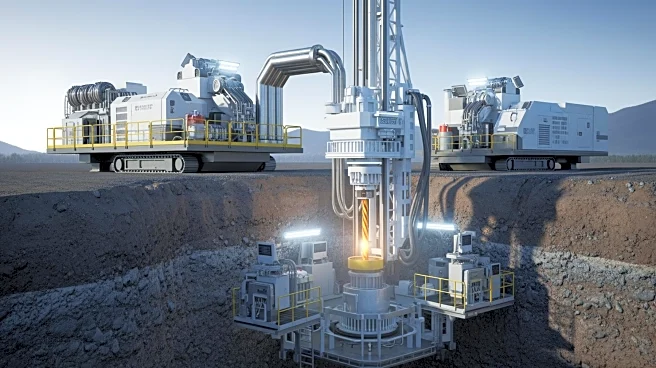What's Happening?
The Abu Dhabi National Oil Company (ADNOC) is leveraging U.S. shale expertise to enhance its unconventional gas production capabilities. This strategic move aims to meet the increasing energy demands driven
by the region's data center expansion. ADNOC is employing hydraulic fracturing techniques, learned from U.S. shale fields, to tap into promising unconventional gas resources in the UAE. Musabbeh Al Kaabi, ADNOC's chief executive for upstream, highlighted the promising results of these efforts, which in some areas exceed those seen in the U.S. The UAE is also constructing the Ruwais liquefied natural gas project, which will significantly increase its gas export capacity. Additionally, ADNOC is expanding its international presence with stakes in export facilities in the U.S. and Africa.
Why It's Important?
The UAE's pivot to unconventional gas production is crucial for its energy strategy, aiming for self-sufficiency in gas supply by the end of the decade. This development is significant as it positions the UAE to capitalize on growing global demand for natural gas, particularly in Asia. The adoption of U.S. fracing techniques underscores the influence of the U.S. shale revolution on global energy markets. ADNOC's efforts could lead to increased competition in the LNG market, impacting global energy prices and trade dynamics. The UAE's success in unconventional gas production could serve as a model for other countries seeking to replicate the U.S. shale boom.
What's Next?
ADNOC plans to continue expanding its LNG trading operations, aiming to trade three times more LNG than it produces. The company is also exploring international partnerships, including potential involvement in a project in Argentina. As ADNOC ramps up its production and export capabilities, it may face challenges such as geopolitical tensions and fluctuating global energy prices. The UAE's focus on unconventional gas resources could prompt other Middle Eastern countries to explore similar strategies, potentially reshaping the region's energy landscape.
Beyond the Headlines
The UAE's unconventional gas strategy raises questions about environmental impacts and sustainability. Hydraulic fracturing, while effective, has faced criticism for its potential to cause water contamination and seismic activity. As the UAE increases its reliance on fracing, it may need to address these environmental concerns to maintain public support and regulatory compliance. Additionally, the shift towards unconventional gas could influence the UAE's long-term energy policy, balancing traditional oil production with cleaner energy sources.











